Shoulder replacement
Shoulder replacement is a very successful surgical procedure to restore mobility and reduce pain in patients with shoulder arthritis or in some cases a severe shoulder injury.
Shoulder arthritis is when the smooth cartilage that covers the bones of the shoulder starts to disintegrate, making it difficult for your bones to comfortably glide against one another. When your cartilage is damaged, you will feel immense pain every time you try to move your shoulder. This is because your bones are rubbing together, causing friction as their natural cushioning has been damaged.
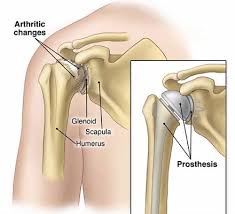
The surgery helps to alleviate pain and helps restore motion, function and strength of the shoulder. This surgery has a very high success rate and 95% of patients who have undergone this surgery will show significant improvements in pain and function.
Shoulder replacement surgery is the removal of portions of the shoulder joint which then get replaced with an artificial joint. It is considered major surgery and you will need to stay in hospital for a few days followed by weeks or months of physiotherapy.
How will a doctor diagnose my shoulder pain?
When you see your doctor, they will ask you to move your arm in different directions so that they can assess your level of mobility and/or pain.
They will then order a set of X-rays along with a CT or MRI scan to determine the condition of your shoulder and all the surrounding tissues.
Once all these tests and examinations have been completed you will see a shoulder surgeon who will discuss your options.
Is a shoulder replacement a major operation?
Yes. There will be many factors to consider before deciding on this surgery. It takes around 12 weeks to get back to some normality and resume some functionality following a shoulder replacement.
Below are some reasons why your doctor may suggest a shoulder replacement:
- Severe stiffness and pain in your shoulder
- Grinding or grating sensation in your shoulder
- Physiotherapy and medication have made no improvements to your pain and function
What is the recovery time for a shoulder replacement?
It can take from eight to 12 weeks (or even longer) for you to fully recover and several more months before you can do any heavy lifting or strenuous exercise.
The day after your surgery, the physiotherapist at the hospital will teach you some exercises to strengthen the muscles around your new shoulder. Your shoulder will be immobilised with a sling at the beginning to allow the tendons that have been cut to repair themselves. You will be able to take the sling off for showering and physiotherapy exercises.
You will feel pain at first, but the hospital will manage this with medication. This will make it easier for you to do the required physiotherapy.
Do I need physiotherapy after a shoulder replacement?
Following your shoulder replacement, is it vital you continue to do physiotherapy alongside with daily exercises at home for the duration of your recovery. It can take a good few weeks for the swelling to go down after the surgery. This will help your strength, flexibility, and mobility. Hopefully, your pain will also subside within this month.

Everyone heals at different rates, so how long you will need physiotherapy for after your surgery differs from person to person. It very much depends on how much exercise you do, how your body heals, and what damage there was to the shoulder prior to surgery.
Your doctor will check that your wound is healing nicely and there is no infection. If you feel your wound has increased redness, increased warmth, or swelling please notify your doctor immediately as this can be treated with antibiotics at home if caught early.
What should I expect after each months’ recovery?
As the months go by, you should notice that you are gradually improving, getting stronger, and feeling more like yourself. As the time goes on you will also notice that your pain has improved significantly and all the swelling from the surgery has gone down.
By six weeks you should be able to use your whole arm for light activity.
After three months, you should have a wide range of motion but you may experience some weakness still. At six months you should be pain free and have at least two-thirds of normal motion and strength.
After a year following your surgery you should be completely pain free and enjoy complete mobility of your shoulder and the full use of your arm.
Everyone is different, so every recovery is different. But the harder you work at your recovery the better and quicker your outcome will be.
What are some good exercises to do at home after my shoulder replacement?
Shoulder girdle exercises
Start by shrugging your shoulders up towards your ears and then roll the shoulders backwards. Squeeze your shoulder blades together.
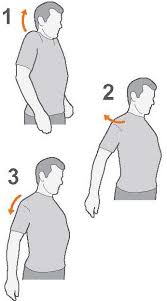
Supported shoulder external rotation
Keep your elbow in place and shoulder blades down and together. Slide forearm back and forth in the outwards direction. You can also perform this exercise using a stick to assist the movement (keeping your elbow at your side). You may feel a stretch in your chest muscle as your are opening it up.
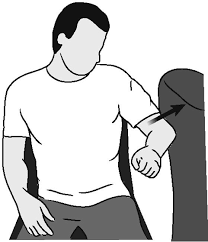
Supported shoulder abduction
Raise your arm out to the side with your elbow straight and palm downwards. Do not shrug your shoulder or tilt your spine. You can also perform this exercise using a stick to assist the movement. Once your arm is level with your ear you can turn your palm so that your thumb is leading the way up until the point of stiffness.
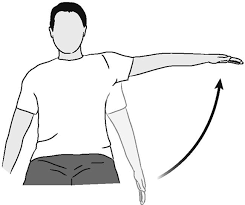
Shoulder extension (isometric)
Stand with your back against the wall and your arms straight out at your sides. Keeping your elbows straight and push your arms back into the wall. Hold for five seconds and then relax.
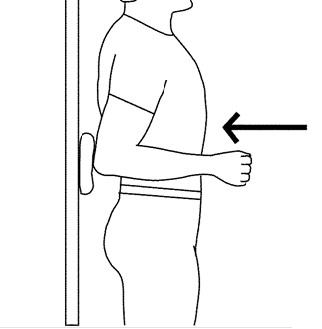
When can I go back to work after a shoulder replacement?
Each patient differs, so time frames depend so much on the motion and strength of your new shoulder and how you are progressing. It depends if you are returning to a sedentary job or a heavy manual job. For a sedentary desk job, it could take six weeks to three months to return. For a heavier manual job, it is likely to take a lot longer.
The key factor to your recovery is physiotherapy after your surgery, to help achieve the maximum benefit of your shoulder replacement. Returning to work too soon can put you back a step, which is why it is recommended that you follow your physiotherapist’s advice.
How long will it be before I can get back to sports?
Once again, everyone’s recovery is different. Your ability to go back to sports is dependant on your pain, strength, and range of movement that you have in your shoulder. Your physiotherapist will be able to advise you what form of exercise to take up that will be safe for your new shoulder.
It is recommended that low impact sports are best, such as swimming, golf, tennis, or badminton. Contact sports should be avoided.
How physiotherapy can help you after your shoulder replacement
We will do whatever we can to get you on the fastest route to recovery. Some of the treatment methods we use include:
- Mobilisation
- Strengthening exercises
- Myofascial trigger point release
- Pilates
- Cross-friction massage
- Stretching and range of movement exercises
- Acupuncture
- Functional exercises
- Kinesio-taping
